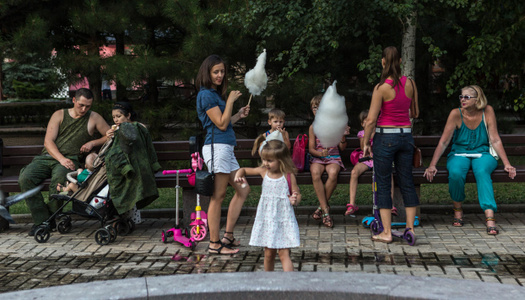
Guns, money, and fun in rebel Ukraine Living at peace in wartime Donetsk and Luhansk
Мы говорим как есть не только про политику. Скачайте приложение.
The active phase of the armed conflict in eastern Ukraine ended a bit over a year ago, but the state of affairs in the region remains just as ambiguous. The “people’s republics” of Donetsk and Luhansk retain their status as unrecognized sovereign states, while shots are still being fired at the front line. On assignment from Meduza, journalist and photographer Nigina Beroeva traveled Donetsk to find out how the city carries on with its daily life, how DPR citizens make their living, how the newborn state approaches nationalization, reconstruction, and the reform of the military, how people work and relax in Donetsk, and what a certain young Russian bank has to do with it all.
MH17: two years later
Malaysia Airlines Flight 17 which was downed outside Donetsk on July 17, 2014, shattering into fragments over the distance of 17 kilometers (10.5 miles), but the official location of the disaster was the town of Grabovo. It was here that a memorial was installed (a granite slab with an inscription “To the Innocent Victims of the Civil War”) and a memorial service was held two years after the crash, by the head of the self-proclaimed Donetsk People’s Republic, Alexander Zakharchenko, and head of the republican parliament, Denis Pushilin. They arrived two days before the ceremony, on July 15, presumably with the purpose of conducting two services on the same day: 13 civilians had been killed in Snezhnoye, a neighboring town, in shelling just two days before the MH17 disaster.
In the scorching sun, young servicemen untangled the flags of the ten countries whose citizens perished in the crash. Zakharchenko delivered a speech and expressed his commitment to assisting investigators and keeping alive the memory of the crime.
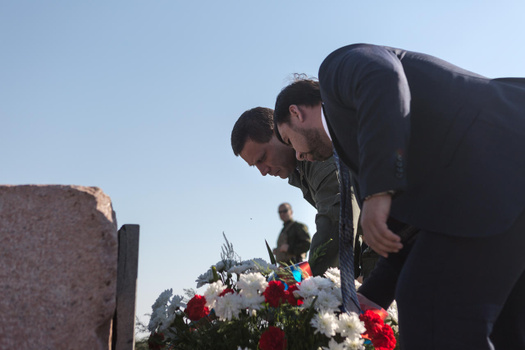
The locals in neighboring villages seem to know exactly whom to blame, however.
“I was cooking outside the house,” says Alexander, a resident of the settlement of Rassypnoye, remembering the day the plane was hit. (By this time, cooking outdoors was typical in the area, thanks to the loss of most basic utilities.) “Suddenly, there were two military planes circling around. One of them dashed higher up, and then the explosion occurred. A part of the plane was flying in our direction and passengers started to fall out of it. The bodies were falling on the roofs, on vegetable gardens, got caught up in tree branches...”
“If it had been a Buk, we would have seen a trail in the sky,” Lyudmila, his fellow villager, says, sharing her military expertise. “Only there wasn’t one. Anyway, our militants never had a Buk in the first place. It was a provocation, apparently; they wanted it to crash in the Russian air space. A pretext to start the Third World War.”
According to the preliminary report by the Dutch Safety Board, the plane was actually downed by a Buk, but investigators have yet to provide incontrovertible evidence of that missile’s origins.
The good news
Some 18 months ago, visitors to Donetsk were welcomed by billboards with a call to arms. Today, they have been replaced by a portrait of Zakharchenko with a dark-red DPR passport in his hands. The banners read, “Become a citizen of the people’s republic!” and they call on residents to pay their bills and fight corruption.
Of course, there is another entrance to the city, but the locals speed past the Donetsk road sign, honeycombed with splinters, and a fragment of the blown-up Putilovsky Bridge, which to this day covers a tank with the crew’s bodies still inside. It is prohibited to stop here.
At the same time, the city center bears little evidence of the ongoing conflict. The streets are quiet, cozy, and clean: the locals say the city has never been so well-kept, not even before the war. Trolleybuses, covered in a patchwork of ads, crawl along wide avenues, past huge flower beds that are tended by numerous municipal workers. Benches by the fountains swarm with elderly ladies in hats of lace and straw, discussing military affairs: “Child, I heard three incoming and two outgoing yesterday. That’s what we call a truce here. It’s a pity you came a bit too late for the theater season. We have some truly amazing performances!”

During the warfare, the principal law-enforcement tools in the DPR were black sites and the death penalty for all kinds of crimes, including drug dealing and corruption. (According to a number of anonymous sources in Donetsk, dealers were executed without even a trial.) Presently, only local police have the right to carry weapons in public. The main boulevard is packed with glamorous coffee shops. In one cafe, a pretty blonde tells a friend over a glass of champagne that her family now owns three cars: one with Ukrainian plates, another with Russian plates, and one more with DPR plates. “We are prepared for any turn of the situation.”
A private entrepreneur named Roman (most of Meduza‘s sources in Donetsk refused to give their surnames, saying they have relatives in Ukraine) says that some residents have even regained their cars, which were seized two years ago. “The courts are overloaded with cases, but rulings are being made and implemented,” Roman says. “A neighbor of mine got his Lexus back. [It was] bullet-ridden, [and had] someone’s blood all over it, but it was returned.”
The businessman complains, however, that a stronger presence of the law has a downside, too: “In Russia, if you break the rules, you bribe the traffic cop and drive on. As for our inspectors, they are afraid to take bribes now, and they stick to writing tickets. How are we supposed to do business in such conditions?”
The tone of the DPR’s official media has changed, too. Instead of the crawling TV caption “The DPR Ministry of Defense is hiring tank crewmen,” the main local channel now entertains its audience with a program called “Good News,” which covers youth festivals, newborn animals in the zoo, and bike taxis from Donetsk to checkpoints in the town of Maryinka. In news reports, however, anchors still recycle talking points about Kiev’s malicious intentions, breaches of the Minsk agreements, and the moral decay of the West.
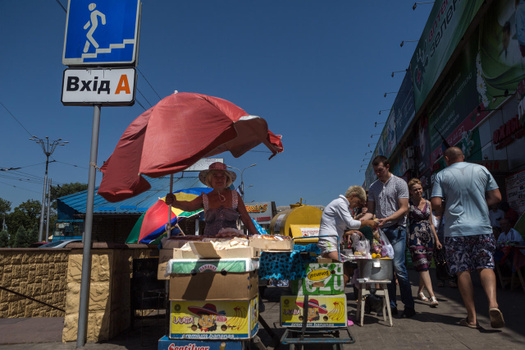
Some residents who fled from the war zone are now returning home. Among them is the family of a young woman named Maria, a third-year student at Donetsk University. At first, her family decided to sit out the military operation in Kiev, at their relatives’ home. Maria’s father stayed behind and fought.
“When I was called a separatist, I kept silent,” Maria says. “But then my brother was beaten up at school, because his father was ‘the enemy.’ I know people in Kiev are not all like that, and some of my friends found a good life there. We weren’t lucky, though. So we went to Russia. It wasn’t a bed of roses there, either. The entire family struggled just to pay the rent. We gave up and returned home. It seems back to normal now, and our district is hardly ever shelled.”
At night, however, Donetsk’s city life comes to a halt. At 11 p.m., the curfew begins, which has been enforced with particular rigor since an attempt was made to blow up a monument to Lenin, says a local bartender. If you’re caught in the street at night, you’re arrested for 15 days. “And that is not the worst option,” the bartender explains. “Recently, there was a secret party in Shakhter Plaza [a nightclub in Donetsk]. They sent a special task force to break it up. The guests were taken almost to the front line, where they made these hipsters dig trenches.”
Those rubles
During the “transition time” (as locals put it), the DPR used dollars, euros, hryvnias, and rubles alike. Price tags in shops listed the cost in all of these currencies. Now the official DPR currency is the Russian ruble (although major enterprises that do business with Kiev and pay Ukrainian taxes, such as plants belonging to entrepreneur Rinat Akhmetov, still pay salaries in hryvnias).
In 2015, the Central Bank of the DPR was established. It processes all public utilities bills and taxes, and even runs a few ATMs accepting only DPR cards.
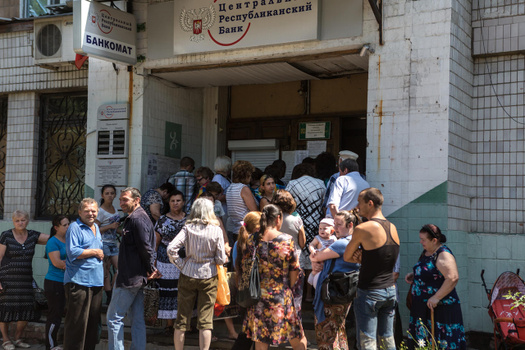
Most people don’t have cards yet. At midday, a Central Bank office in Petrovsky district is besieged by a line that stretches outdoors at a considerable distance. Fifty people try to hide from the sun in the shadows cast by three trees and a canopy at the entrance. Most likely they will have to wait throughout the afternoon. Fiddling with a baby stroller, a woman named Svetlana explains that she’s here for the children’s allowance, which is 2,000 rubles ($30). “What can I buy with this? My mom is now waiting in line for humanitarian supplies, and we also have a vegetable garden. That’ll keep us alive.”
Formally speaking, many residents are entitled to Ukrainian social welfare, as well, but applying for it entails traveling to Kiev-controlled territory; moreover, after the economic and financial embargo was imposed, people started to come up with various schemes to cash these benefits. Presently, the authorities in Kiev are tightening their grip on retirement pensions: in order to receive an old-age pension, you need to reside within the territory controlled by Ukraine. As a result, senior citizens are forced to live off 2,000–3,000 rubles ($30-45) per month, with prices starting at 12 rubles ($0.18) for a loaf of bread, 30 rubles ($0.46) for a carton of milk, and 150–200 rubles ($2.30–3.00) for a month-long public transport pass.
Many people rely on humanitarian supplies. One of the primary suppliers is Rinat Akhmetov himself. Throughout the conflict, almost 9 million “survival kits” have been distributed in the region. “I used to be ashamed to wait in line for these,” says Andrei Vitalyevich. “I am an associate professor, after all—once a man of certain influence. But you get used to anything.”
The Donbas also receives humanitarian supplies from Russia: more than 50 “white convoys” (the local term) have been sent to the city since the conflict broke out. Costs are being cut here, as well: as the DPR Center for Reconstruction Governance told Meduza, a recent order from Zakharchenko has restricted the distribution of supplies to certain categories of the population. The prioritized groups are disabled people, senior citizens with minimal pensions (2,100 rubles, or $32), and families with multiple children. The convoys arrive less frequently now: roughly once a month, with the exception of June, when the trucks never reached Donetsk, for technical, still unexplained reasons, and supplies were only delivered to Luhansk. July’s convoy made it to the DPR, though.
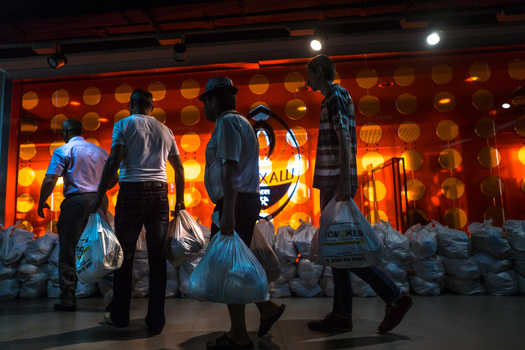
A Russian ‘NCO’: How money makes it across the border
Along with what appears to be ordinary life, seemingly normal business is returning to Donetsk and Luhansk, as well. Businesspeople are starting to adapt to the limitations of the economic embargo.
“Every time there is an embargo, there is smuggling. It goes across both borders, the Russian and the Ukrainian,” explains the owner of a small business that trades with both Russia and Ukraine. “Pay 12 hryvnias per kilogram at the checkpoint and bring as much as you want. The military have been making a fortune on it for two years now. Here [on the DPR side], it has become trickier to get away with a bribe. But the Ukrainians are fine with it. Just imagine: an entire meat processing plant runs on contraband Ukrainian meat.”
A businessman named Roman confirms that he has no problem shipping cargo to Ukraine by railroad (unlike the motorways, it hasn’t been blocked, although it’s experienced some downtime because of shelling and workers’ strikes). Roman says that coal from mines and from Akhmetov’s plants is delivered in the same fashion. “They are waging a war against us, while buying our coal. So much for the war,” the businessman says.
At the same time, the border between the DPR and LPR is equipped with an actual custom house. Igor from Yenakievo, who is struggling to revive his construction business, expresses his resentment: “Just imagine, for me to deliver goods to Luhansk or back here, I need to get customs clearance twice each time. The authorities are trying to make money on everything! Help the business to recover! Suspend the taxes for a while.”
Donetsk businessmen say they would gladly shift their focus to Russia, if it weren’t for the circumstances. Russia has not recognized the self-proclaimed republics, and the latter do not have any banks, except their own central banks.
The central banks of Donetsk and Luhansk process all the social welfare payments and salaries. They also serve as terminals for public utilities bills and taxes. Businessmen open accounts in these banks and transfer money freely within the system, that is, to other clients of the bank. Moreover, a bank account is a requirement to obtain permission for external economic activity. According to a number of businessmen, few of them keep all their money in central banks; the amounts on the balance are confined to a necessary minimum to pay for orders. Entrepreneurs normally keep a share of their profits in Russian and Ukrainian banks.
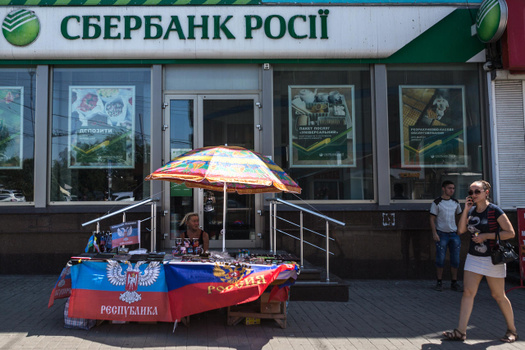
The legal import and export of goods is conducted through an intermediary state, South Ossetia, which has been recognized by Russia and which has recognized the DPR and the LPR. But this workaround is lengthy, bureaucratized, and inconvenient. You can find an easier way advertised on the streets of Donetsk: “Import. Export. NCO.”
One businessman from Donetsk explains how the scheme works: in order to do business with Russia, a DPR or LPR company has to obtain permission for external economic activity and open an account at the central bank. The company’s Russian partners will need an account at the “NCO in Rostov.” It is here that money is transferred from the company’s accounts in republican banks.
In Russian, the abbreviation coincides with the acronym for “non-profit organization,” but it is a wide misconception to read it as “non-commercial organization.” The NCO in question is called the “Center for International Settlements.” The official status of the center is indeed an NCO, but the abbreviation actually stands for “non-bank credit organization”; such entities can perform certain banking functions, but cannot open accounts for private citizens, among other things. The Center for International Settlements was founded in Moscow in 2015, and it was granted a banking license in April 2016.
According to the Russian federal tax service, the center’s exclusive shareholder is ZAO Forward (a closed corporation). ZAO Forward’s founders are the companies RBC-TV and RBC-TV Moscow, but in the summer of 2014, the RBC holding sold its Forward shares to an offshore company called Gattico Holding Ltd., owned by RBC at that time. Earlier, in January that same year, Gattico Holding Ltd. was excluded from RBC‘s group of subsidiaries (RBC‘s spokesperson, Egor Timofeyev, confirmed that both companies were excluded from RBC Group in the latter half of 2014 “in the course of the holding’s general restructuring”).
According to the documents, ZAO Forward’s general director since April 1, 2015, has been Vyacheslav Mazurin. A week later, on April 8, he founded the Center for International Settlements and chaired its board of directors. Mazurin is a certified lawyer; he graduated from the Dzerzhinsky Higher School of the Soviet KGB in 1981. Prior to heading ZAO Forward and the center, Mazurin worked as the deputy director in a Crimean company called Yuzhny Comfort, overseeing corporate security.
The two other members of the Center’s board of directors previously worked for the Russian National Commercial Bank, side by side with half of the company’s management team. RNCB is one of the major banks operating in Crimea. Initially, RNCB was a subsidiary of the Bank of Moscow, but after the Crimean referendum it was sold on the grounds of sanction risks. Since January 2016, the bank has been state-owned, with 100 percent of its shares controlled by the Federal Agency for State Property Management.
Branches of the Center for International Settlements are located precisely along the border between Russia and Ukraine’s unrecognized separatist republics: in Novoshakhtinsk, Gukovo, Donetsk (the town in Russia’s Rostov Region), and Taganrog. The head office is in Moscow. When Meduza‘s correspondent called the Novoshakhtinsk branch under the guise of a Russian entrepreneur seeking to settle payments with parties in Donetsk and Luhansk, the operator confirmed that it required opening an account with the center, which will accept payments from the DPR Central Bank. The Rostov company Zeleny Coridor, which renders assistance to those who engage in trade between Russia and the unrecognized republics, suggested a similar mechanism involving the aforesaid center. At the same time, if an individual or a company prefers not to make direct arrangements with companies in Donetsk and Luhansk, any commodities can be sold to Zeleny Coridor, which can later deal with such companies.
The exact procedure of transferring money from republican central banks to Russian banks remains unclear. The Center for International Settlements chose not to answer Meduza‘s letter of inquiry. The bank informed us that the letter was being processed and the management would contact the correspondent, should they deem it necessary, and asked that we stop calling until then.
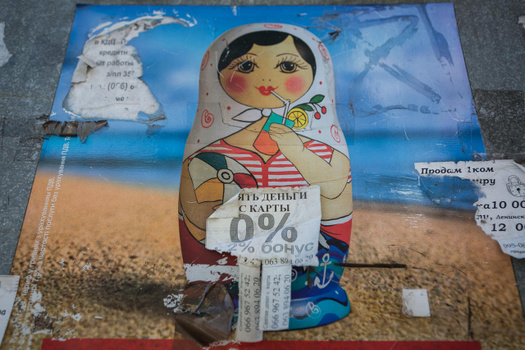
Russian experts, auditors, and lawyers prefer to abstain from comments on this topic—at least under their own names.
“The only option is moving money in cash,” says a Russian financial expert who chose not to disclose his identity. “In other words, businessmen used to move cash across the border in their own suitcases, and now they have to do it in an organized fashion, taking certain security measures.”
This presumption is shared by Marina Yemelyantseva, a lawyer at the Delovoy Farvater firm. “A Russian bank is unlikely to open an account at the DPR Central Bank, but Russian banks may well open accounts for entrepreneurs from the DPR,” she speculates. “As for money transfers from Russian accounts to Donetsk ones, the only possible way is actually moving cash: withdrawing in one bank and depositing in another.”
Judging by the Center for International Settlements’ financial report, over the eight months of 2015, the assets of the company, which was then still denoted as a non-bank credit organization, approached a total of 11 billion rubles ($170 million). Bankir.Ru analyst Alexander Kudryavtsev points out that the bank thrives on interbank credits of unknown origin. “The entire amount of financing has been obtained from non-resident banks, but the bank does not provide the details of its initial counterparties,” the expert notes.
According to Intercom-Audit BKR, in 2015, when the Center for International Settlements operated without a banking license, the center’s per-borrower exposure (H6) amounted to 227 percent. Russia’s Central Bank requires this figure to stay within ten percent, but this regulation applies to banks, leaving behind non-bank credit organizations.
Nationalization
In spite of all the hardships, there is no shortage of goods in Donetsk’s shops. The choice leaves much to be desired, but in essence you can find everything. Alcohol is already labeled with DPR excise stamps. Some of the foods in Luhansk bear the label “Made in the LPR.” Cigarettes are imported from Ukraine, Russia, and Bulgaria (the latter are the cheapest). The city has a few state-owned shops, such as a chain called “First Republican Supermarket.” The republican administration has also got hold of the shops left behind by the Metro international retail chain: on May 31, Zakharchenko signed an order for them to be transformed into a state-owned retail chain called “Most” (“Bridge”).
The developing local business, as well as the Minsk agreements, are threatened by the law on nationalization, which has already been passed by the DPR People’s Council, but remains unsigned by Alexander Zakharchenko. Theoretically, this law stipulates the procedure of nationalization of properties and enterprises which belonged to the state and businessmen prior to the war. But the actual text of the document has not been published on the parliament’s website, in spite of the law having been passed by the deputies.
“It is Zakharchenko’s most powerful weapon,” explains an ex-member of the Party of Regions from Donetsk, who asked Meduza not to reveal his name. “The Ukrainian authorities have to understand that, unless they meet the demands of the DPR, this weapon will be used against them. Oligarch-owned enterprises will be nationalized and their former owners will seek redress from Kiev.
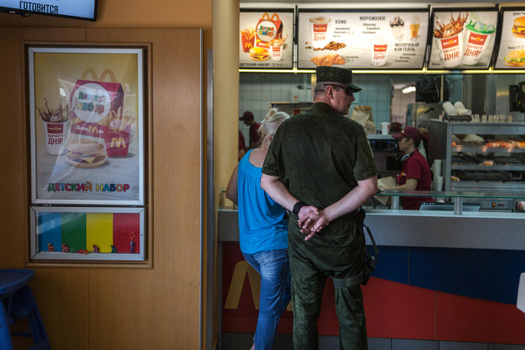
In the meantime, nationalization is conducted under the label of “temporary public administrations”: according to Donetsk officials, such administrations are imposed on non-operating enterprises whose owners have left the republic. It was exactly what happened to the Metro retail chain, three plants, two bus stations, three traffic control stations, a dental clinic, and 21 coach terminals. And this list covers only the period since May 2016. In addition, the DPR government has temporarily taken over the Gorlovka Machine Engineering Plant, which used to be part of Rinat Akhmetov’s network, and the Donetsk Electrometallurgical Plant, which is an asset of a Russian company called Mechel. Mechel’s site claims that the company will “take every necessary step to protect its rights and interests as provided by law.”
Meanwhile, the republic is actively nationalizing its markets, in accordance with its law on market activity. Before the war, Donetsk had over two dozen markets. Some of them have already been nationalized, and rent is owed to the state treasury. The People’s Council even has a committee dedicated to the issue, tasked with elaborating enforcement mechanisms and settling disputes.
The process has been ongoing for a year, according to Viktor Stepanov, the director of the Mayak market. Seized markets are transferred to the state-owned enterprise Rynki Donbassa (“Markets of Donbass”). “First, they went for markets whose owners left when the war broke out,” he explains. “With us, it was more difficult, as we never left and continued the trade even during the bombardments. We used to have some minor leverage in the government—enough to keep us out of harm’s way.” Currently, the parliamentary committee is considering the nationalization of Stepanov’s market, too, and the hearing on the matter took place without him being allowed into the room. He is certain that his business will be confiscated, even though his documents are “near-perfect” (according to him). “They are feeding us with promises about compensation,” he complains. “But who makes the assessment and what are the reference prices?”
Colonel Sergei Zavdoveyev, codename “Frantsuz” (“Frenchman”), who chairs the parliamentary committee, promises that business owners will be compensated fairly.
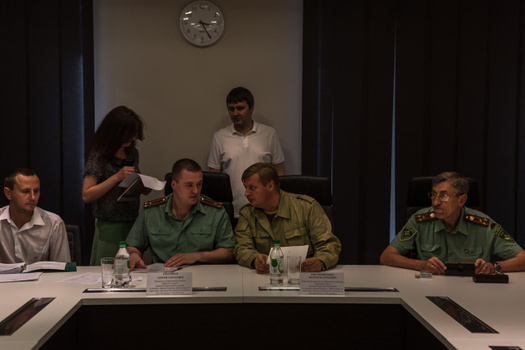
“We are at war now,” explains Zavdoveyev. “A young nation is being born. For us to function, we need to get the plants back up. EIghty percent of proprietors have fled to Ukraine and are now financing the ATO [anti-terrorist operation]. The facilities have been abandoned, they are decaying, and being robbed by marauders. We live off humanitarian supplies. But they won’t flow in forever. We must not be freeloaders, leeching off other states.”
Reconstruction
Sergei Naumets, the man responsible for the reconstruction of the war-ravaged region, returned to Donetsk from Sochi, where, among other things, he engaged in the construction of Olympic venues. His family still lives in Russia.
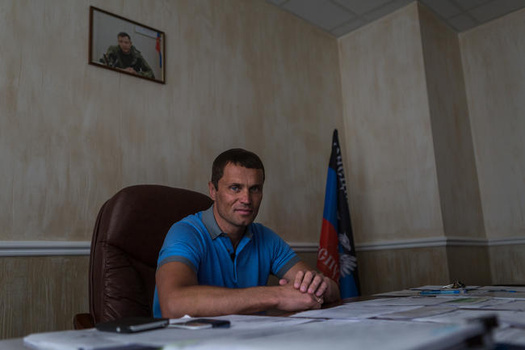
In the DPR, Naumets heads the Ministry of Construction, which is responsible for the post-war reconstruction of the region. As the official says, the priorities were utilities and facilities of social importance. Presently, they have entered the second stage of reconstruction, which includes 1,500 properties. Building supplies are also provided by Russia as humanitarian aid. Naumets refused to give the total cost of the work underway, revealing only that the average cost of a square meter in private housing is 30,000 rubles ($464). (In general, Donetsk officials are not keen on discussing financial matters. A letter of inquiry to the Ministry of Finance about the republic’s budget produced only the vague response: “It is socially oriented.”)
Local businessmen say participating in reconstruction work is one of the few chances to make money in the DPR. Construction is carried out by the general contractor, the Donbasstroy Trust, and its subcontractors. They work quickly; thus, the reconstruction of school 50 was completed within a month, despite the massive damage. “We are all doing our best. First, we need to put the city back in order; second, we have Russian supervisors overseeing our work. What if they invite us to work for them later?” a construction company director tells us, asking not to reveal his name. “The trust is Donetsk-based, but it is actually governed by a Russian company. We can all well see there is no development ahead. Everything is built from Russian supplies and paid for with Russian money. It is Russian enterprises that profit from this, while our economy is left with almost nothing. As soon as we are through with the reconstruction, there won’t be any major development for a considerable time. It’s time to leave. I have a small kid, so what country is he going to be a citizen of? An unrecognized one?”
Despite the rapid pace of reconstruction, Donetsk has a long way to go to return to normal life again. Thus, in the Oktyabrsky district, adjacent to the airport of Donetsk, there are hardly any houses that aren’t damaged by shelling, and there is no telling when the authorities will find the resources to rebuild them. The ruins are disappearing beneath grass and flowers, and the roads are patchy with ink-black spots of mulberries, with no one to gather them.
At one point in the field, Meduza‘s correspondent is approached by a group of young men in military uniform. They insist on accompanying the reporter for the rest of her mission, warning her against taking photos of the famous nine-story building outside the airport: it is the highest construction in the area and a favorable strategic position. One of the soldiers, who introduced himself as Vitaly, says that he came to Donbass from Chelyabinsk: he started an affair with a girl from Gorlovka, “came to take a glimpse of the war,” and ended up sticking around.
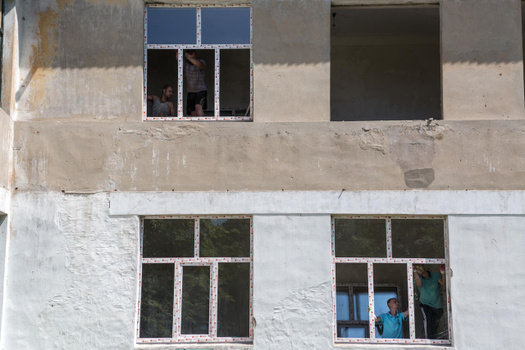
Stratonavtov Street in the same district has only two families left of all the residents: elderly twin sisters, and a brother and sister, who recently buried their father. Other residents come to remove the debris and tend their vegetable gardens; here and there, among the ruins and blast craters, neat, weed-free garden beds are scattered.
Officials of the Donetsk Directorate for Capital Construction (under the Ministry of Construction) have been visiting such sites for two years now, recording the damage done and assessing the amount of supplies necessary for reconstruction. Nevertheless, according to Larisa Pulina, the Directorate’s lead specialist, the authorities will only rebuild the facade when it comes to actual renovation, patching up roofs, mending walls, and installing windows. The rest of the work falls to residents themselves.
The Novorossiya Project
The formation of the DPR regular army, officially referred to as the People’s Militia, began as early as late 2014, but it took quite some time to ensure the subordination of all the volunteer battalions and squads to the new administrative structures, and the army didn’t take its final shape in this year. According to soldiers from a number of divisions who agreed to speak to Meduza, the integration of battalions did not always go smoothly, with many commanders attempting mutiny. Press regulations have changed, too. The times when you could simply drive to the front line, speak to the commander, and go about doing your job are long gone. The order prohibiting access to the front line for reporters without a special permission was issued a few months ago; independent press representatives can hardly enter the republic and the DPR has denied accreditation to multiple journalists over the last year.
“We had to restore order among the troops,” says a former businessman, now lieutenant with the code name “Granitsa” (“Border”). “And the Russians are being helpful. Not more than that. They provide experts. They explain how to make things right. Many of ours [soldiers] have not had enough training. They don’t know the technical characteristics of weapons or battle tactics. We are now polishing it at training facilities. We make notes, on our tablets sometimes. And then we pass on the knowledge to our subordinates.”
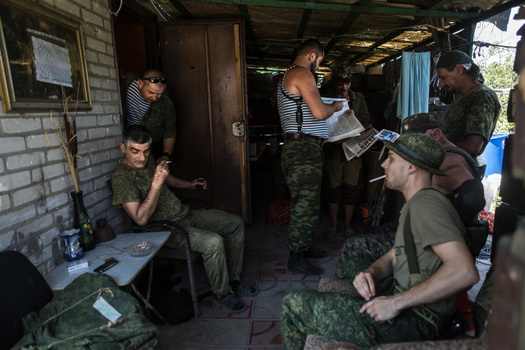
The conversation takes place in a private house not far from the Donetsk airport, where Granitsa’s section is quartered. The house used to be a luxurious summer cottage, but now it features a sooty potbelly stove and a row of machine guns in the corner by the door. The distance between these quarters and the front line is barely two kilometers (1.2 miles), but no one is firing shots during the day: the heat reaches 50°C (122ºF) in the sun. “You can fry eggs on a tank,” the soldiers laugh. The guns go live at night. The shots are heard even in the city center. The locals can already tell by the sound whether it’s “incoming” or “outgoing,” whether the airport is under attack or the gunfire is at Staromikhailovka. Rare, standalone blasts do not catch anyone’s attention now, but recent nights seem to bring trouble more often, with endless shellings keeping everyone awake: both the residents of Oktyabrsky district and the soldiers confirm that the summer of 2016 has brought more shooting.
The quarters of senior lieutenant Petrovich is even closer to the contact zone. The front line is just 400 meters (about 430 yards) away from Ukrainian soldiers. The trenches are lined by seed beds with cucumbers and tomatoes: it doesn’t look like anyone is going to leave the site.
“Take the English Brexit, for example, or whatever it is called,” argues Petrovich. “The whole world respects the people’s decision, and no one’s deploying troops. The Scots have held a referendum, too, without any trouble either. Why isn’t our referendum respected?”
Kiev and the rebels can’t even agree on what to call the war: the DPR and the LPR call it a civil war, while Kiev says it’s a “patriotic” war. The most common point in Donetsk, brought forward by soldiers on the front line, and women chatting on park benches and politicians alike, is that the authorities in Kiev started to enforce their ways in the region after the Euromaidan Revolution. Meanwhile, Kiev regards the Donbass as a territory occupied by Russia.
The main question for the people of the DPR is why Russia is not making any efforts toward annexing Donbass. In spring 2014, those who participated in public actions in support of independence were confident of the region following Crimea’s steps. Even now a taxi driver still translates rumors that Russia has already manufactured license plates for the new region. But hopes for a Crimea-like scenario are dwindling.
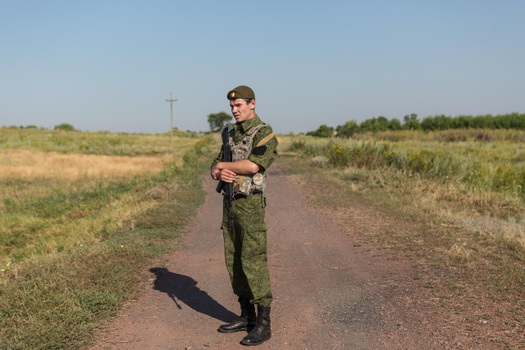
Denis Pushilin, head of the DPR People’s Council, is evasive on the subject. “Indeed, in 2014, many were in favor of integration with Russia,” he says. “I guess it would have been right. But Russia observes the regulations of international laws. As for Crimea, the process was within legal boundaries. With us, it’s a different story—this is why we initially held a referendum not on integration into Russia, but on sovereignty.”
“Now we have an option of reuniting with Ukraine; not as a federation, but as a confederation,” argues Pushilin. “We are facing the challenge of reforming the entire country. As for now, we are building a republic that will become an example for every other region.”
The DPR officials are waiting for Kiev to pass laws on the special status of the Donbass, on decentralization and, most importantly, on total amnesty. However, should the latter be passed, few people in the region would be confident about their safety. “If the authorities in Kiev invade, they will bring death on our region—literally,” says Pushilin. “I mean civilians, as well, because those in power do not stand a chance anyway.”
Andrei Purgin—the founder of the Donetsk Republic movement, which had been launched prior to the events of 2014, one of the leaders of the so-called “Russian Spring” and now one-step short of an oppositionist—views the situation as part of the “civilization dead end,” but believes that the region must not give up “the dream of reuniting with Russia.” “Consider the concept of a region’s association coefficient. Crimea’s coefficient was 8–10 times as low as the Ukrainian average, while that of the Donbass is higher than it is in most other regions,” he explains. “This is why the Crimean scenario was out of the question. I did sign a document calling for Russia to annex the region, but it was nothing but a declaration.”
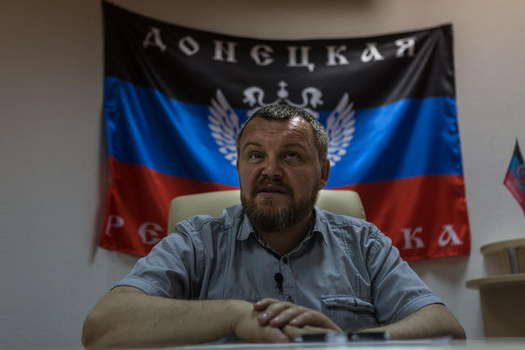
The politician defines the DPR’s major issue with a bitter Russian saying: “Either put your pants on, or take your cross off.” In his view, the republican administration’s attempt of power centralization leads to a bureaucratic collapse. “The ministries deprive local authorities of their powers, but do nothing to replace them. The result is disastrous,” Purgin says today with indignation. “I can’t even say that a certain minister is incompetent; it’s the system that fails in general. On the one hand, we are waging a war, but on the other hand we are trying to prove that we are at peace. And the people get a cognitive dissonance: why aren’t nightclubs prohibited if we are at war? Why is there a customs checkpoint between Donetsk and Luhansk and why is your passport and baggage checked twice? This is not what people had in mind when they walked out into the streets. The authorities are trying to replicate the Russian state apparatus on a tiny, war-torn territory.”
Today, Purgin shares his thoughts about “building a paradigm of further development” at various meetings and forums, mostly in Russia. He does not interact with the DPR dignitaries much anymore.
The Donetsk resort
Sedovo is 130 kilometers (80 miles) from Donetsk, but it takes almost three hours to get there. The road is in pieces. It had been like this even before the war, as few tourists ever came here. Donetsk residents used to travel abroad, to Berdyansk, or to Crimea.
Presently, Sedovo is the one and only resort you’ll find in either of Ukraine’s two unrecognized republics, being the only outlet to the Azov Sea. Almost everywhere, there are “no vacancy” signs. A former shed has been upgraded to a “double room”: 200 rubles ($3) a night per bed, 400 rubles ($6) for the entire room, with amenities available outdoors, in the yard. Sheds, hen houses, canopies, and attics are also being refurbished to accommodate guests. Residents of Sedovo, where jobs have been particularly scarce lately, are welcoming the opportunities brought by the holiday season.
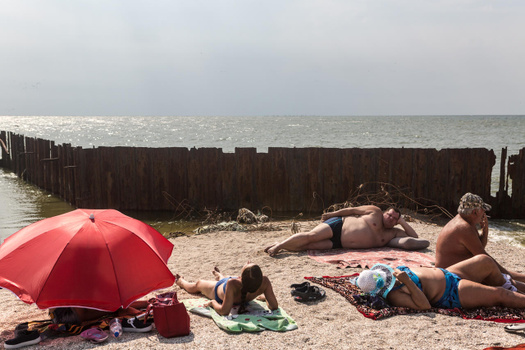
Sedovo also has a few sanatoriums, but a 10-day stay in one of the best, Metallurg, costs almost 12,000 rubles ($185) per person, which is a considerable sum for Donetsk and Luhansk. Rooms are also available in less spectacular hotels, those reopened after years of dilapidation. A double room is 600 rubles per night ($10), with a shared shower and a scheduled water supply.
Children jump into the sea from rusty piers with loud shrieks, and grownups chill in the shadows cast by wrecks of fishing boats. Every beach is equipped with counters selling ice cream, juice, and beer.
“Since the war broke out two years ago, it is our first vacation away from home,” says Svetlana from Yenakievo, who has rented a room in the private sector. “The kids couldn’t go to sleep. They said it was too quiet without any explosions nearby.”
Entertainment is meager, too: there’s an amusement park for kids and shooting ranges for grownups. Popular targets are portraits of politicians of post-Maidan influence, like Yatsenyuk, Poroshenko, Tymoshenko, and Obama. “See? Beaten to a pulp,” laughs the shooting-range owner, gesturing at the portraits, torn up and distorted. “Although recently an old man came asking for Putin’s portrait to shoot at.”
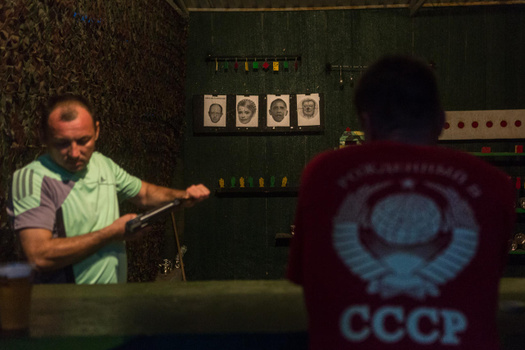
Ex-militia (now men serving in the people’s police) also spend their vacations in Sedovo. Alexander Zakharchenko came here twice, which was immediately reported by the local TV channels. “Militiamen used to put on airs, get drunk, and shoot, making all sorts of trouble,” recalls a waitress in one of the bars. “It is much quieter now. No one is toting guns any more. Only when commanders come with armed guards to protect them.”
Just like in Donetsk, there’s a curfew underway in Sedovo. Trespassers are apprehended for the night at the Novoazovsk checkpoint, to be released in the morning. This is why fun starts early here.
At sunset, people move from the beach to the street with a never-ending row of bars. Suntanned children munch on multicolored cotton candy.
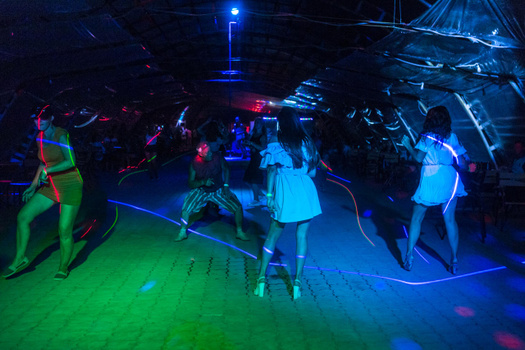
The entrance fee for the “Miami Nightclub” is 50 rubles for women ($0.75) and 100 rubles for men ($1.50). A laser show blinds your eyes and paints the guests. Young girls in short dresses, older women, and young men in civilian outfits order cocktails and beer at the bar and dance. Some of them try to climb the podium. The DJ shouts over the music: “DPR! Sedovo! Show me your hands!” and hits play on Bon Jovi’s “Itʼs My Life.”
A man in uniform is dancing slightly away from the crowd, surrounded by armed security guards. In tune with the deafeningly loud chorus, he screams: “D! P! R!”
This text was translated from Russian by Ksenia Khudadyan.
Nigina Beroeva
Donetsk – Luhansk – Moscow